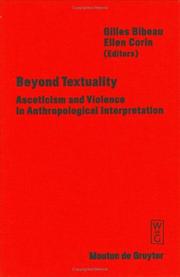| Listing 1 - 2 of 2 |
Sort by
|

ISBN: 3110138891 3110903016 Year: 2012 Volume: 120 Publisher: Berlin ; Boston : De Gruyter Mouton,
Abstract | Keywords | Export | Availability | Bookmark
 Loading...
Loading...Choose an application
- Reference Manager
- EndNote
- RefWorks (Direct export to RefWorks)
Philosophical anthropology --- Literature --- Semiotics --- Anthropologie dans la litérature --- Anthropology in literature --- Antropologie in de literatuur --- #SBIB:39A8 --- #SBIB:39A5 --- Culture --- -Anthropology in literature --- Anthropology --- -Participant observation --- -Participant research --- Participatory research --- Observation (Psychology) --- Social sciences --- Human beings --- Cultural sociology --- Sociology of culture --- Civilization --- Antropologie: linguïstiek, audiovisuele cultuur, antropologie van media en representatie --- Kunst, habitat, materiële cultuur en ontspanning --- Semiotic models --- Philosophy --- Fieldwork --- Social aspects --- -Antropologie: linguïstiek, audiovisuele cultuur, antropologie van media en representatie --- Participant observation --- Anthropology in literature. --- Participant observation - Philosophy. --- Participant research --- Ethnology --- Methodology --- Semiotic models. --- Philosophy. --- Research
Book
ISBN: 9949320682 9949113067 Year: 2012 Publisher: Tartu University of Tartu Press
Abstract | Keywords | Export | Availability | Bookmark
 Loading...
Loading...Choose an application
- Reference Manager
- EndNote
- RefWorks (Direct export to RefWorks)
Marina Grishakova belongs to the younger generation scholars of the Tartu-Moscow school of semiotics. Her book is part of a semio-narratological tradition of a single author or a single work research that tackles issues of wider theoretical import: applicability of the concept of “modeling” in the humanities, theory of mimesis and the function of experimental literature in (post)modernist culture. By drawing on Y. Lotman’s conception of artistic models, the book adopts the semiotic perspective on modeling as an open-ended heuristic process underlying the logic of discovery and creative thinking. The book discusses the models of time and memory in modernist culture (Nietzsche’s and Bergson’s philosophy of time, Minkowski’s research on the psychopathological types of temporality) and their relevance to Nabokov’s fiction; popular-scientific notions of serialism and the fourth dimension; thematizations of the observer in modernist philosophy and arts; visual “prostheses” and “machines” (Eco), particularly the “camera vision” metaphor, its relation to Bergson’s notion of automatism and the popular idea of the criminal use of hypnosis. Vision is thematized also as a means of seduction and noncoercive control. Even before Foucault, Baudrillard and other critics of modernity, Nabokov noticed that advertising, political propaganda and erotic seduction alike employ implicit forms of suggestion. The book revises Rorty’s dilemma of “autonomy” and “solidarity” as applied to Nabokov’s work and offers new readings. It considers categories of narrative poetics as forms of cultural encoding that broaden and transform reader’s modes of perception and sense-making. Micro-models active in certain contexts or in the works of certain authors function as mobile interfaces between individual sensibilities and complex cultural chrono- and spatio-types where time and space take on conceptual meaning.
Languages & Literatures --- Slavic, Baltic and Albanian Languages & Literatures --- Nabokov, Vladimir Vladimirovich, --- Criticism and interpretation. --- Sirin, Vladimir, --- Sirin, Vl. --- Sirin, V. --- Nabokoff-Sirin, Wladimir, --- Sirin, Wladimir Nabokoff-, --- Nabokov, Vladimir, --- Shishkov, Vasiliĭ, --- Набоков, Владимир Владимирович, --- Набоков, Владимир, --- נאבוקוב, ולאדימיר ולאדימירוביץ׳, --- נאבוקוב, ולאדימיר, --- נבוקוב, ולדימיר, --- 納布可夫, --- Godunov-Cherdynt︠s︡ev, Fedor --- time and space in literature and philosophy --- semiotics --- Vladimir Nabokov --- semiotic models --- narratology --- Russian literature --- modernism --- visual studies --- American literature --- metaphor
| Listing 1 - 2 of 2 |
Sort by
|

 Search
Search Feedback
Feedback About
About Help
Help News
News